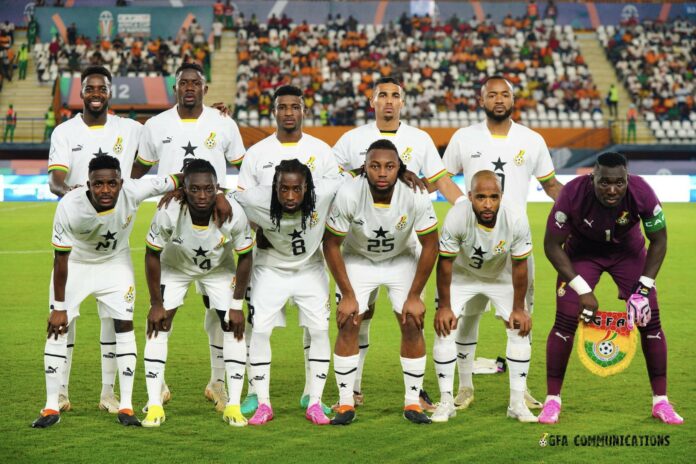The Black Stars, Ghana’s national football team, have historically been a source of national pride.
However, recent years have witnessed a decline in their performance, leading to questions about the leadership, selection processes, and overall management of the team.
This paper will delve into the key issues affecting the Black Stars, including captaincy controversies, the inclusion of local talent, performance struggles, and the broader role of government and other stakeholders in the development of Ghanaian football.
Captaincy Controversies and Leadership
The captaincy of the Black Stars has often been a subject of debate, particularly in recent years. The transition from Asamoah Gyan, a legendary figure in Ghanaian football, to Dede Ayew has been marked by controversy and discontent among fans.
While Dede Ayew is undoubtedly a talented player, his appointment as captain has raised questions about the transparency and merit-based nature of the selection process.
The frequent changes in captaincy have created instability within the team and disrupted the leadership hierarchy. A strong and consistent captain can provide guidance, motivation, and unity, which are crucial for a successful team. The GFA must establish a clear and transparent process for selecting captains, based on performance, leadership qualities, and experience. This will help to avoid future controversies and ensure that the most deserving players are given the opportunity to lead the team.
Inclusion of Local Talent
One of the long-standing issues in Ghanaian football is the underutilization of local talent. While the Black Stars have traditionally relied heavily on foreign-based players, there is a wealth of talent in the domestic league that is often overlooked.
The GFA must prioritize the inclusion of local players in the national team, as this will not only boost the morale of domestic players but also improve the overall quality of the team.
To achieve this, the GFA should implement a robust scouting system to identify and nurture young talent from the local leagues. Additionally, the GFA should work with clubs to create a conducive environment for player development, including providing adequate training facilities and coaching. By investing in local talent, the GFA can build a sustainable pipeline of players for the Black Stars.
Performance and Qualification Struggles
The Black Stars’ recent struggles to qualify for major tournaments, such as the Africa Cup of Nations and the FIFA World Cup, have been a major disappointment for Ghanaian fans. A number of factors have contributed to these failures, including poor coaching, tactical deficiencies, and a lack of team cohesion.
To address these issues, the GFA must prioritize the appointment of experienced and qualified coaches who have a proven track record of success. The coach should be given the autonomy to select players based on merit and implement a clear tactical plan. Additionally, the GFA should create a stable and supportive environment for the coach, allowing them to focus on their job without undue interference.
Another crucial factor in improving the Black Stars’ performance is the development of a strong youth development program. By investing in youth academies and providing opportunities for young players to gain experience, the GFA can ensure a steady supply of talented players for the future.
The Role of Government and Other Stakeholders
The government of Ghana, as the primary stakeholder in the development of the country’s sports industry, has a significant role to play in the success of the Black Stars. By providing adequate funding, infrastructure, and policy support, the government can create a conducive environment for football to thrive.
The private sector also has a crucial role to play in the development of Ghanaian football. Corporate sponsors can provide financial support to clubs and the national team, while media organizations can help to promote the sport and increase its popularity.
Other stakeholders, such as football fans, the media, and football administrators, also have a responsibility to contribute to the development of Ghanaian football. By supporting the national team, providing constructive criticism, and promoting fair play, these stakeholders can help to create a positive atmosphere for the growth of the sport.
A Comprehensive Approach to Revitalizing the Black Stars
To revitalize the Black Stars, a comprehensive approach is needed that addresses all aspects of the game, from grassroots development to the national team. This approach should involve the following:
* Strong Leadership: The GFA must provide strong and visionary leadership to guide the development of Ghanaian football.
* Youth Development: Investing in youth development programs is essential for the long-term success of the Black Stars.
* Infrastructure Development: Adequate training facilities and stadiums are crucial for the development of the sport.
* Coach Education: Investing in coach education can improve the quality of coaching at all levels.
* Financial Stability: Ensuring the financial stability of clubs and the national team is essential for their success.
* Governance Reforms: Implementing good governance practices can help to improve the management of the sport.
* Fan Engagement: Engaging with fans and building a strong fan base can create a positive atmosphere for the sport.
* International Cooperation: Collaborating with other football associations can help to improve the quality of Ghanaian football.
By implementing these strategies, the GFA and other stakeholders can work together to revitalize the Black Stars and restore pride to Ghanaian football.
Script by: Raymond Koffie, CMILT.
Chartered policy logistics and transportation scientist/ consultant. Freelance , Football enthusiastic. [email protected]. 0244512817













